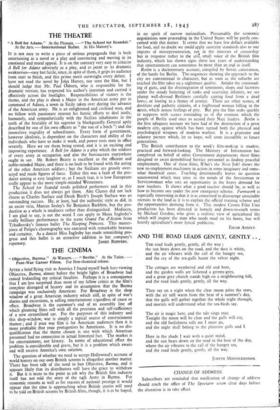THE CINEMA
" Objective, Burma." At Warners.—" Berlin." At the Tatler.— Post-War Career Films. For Non-theatrical release.
AFTER a brief flying visit to America I found myself back here viewing Objective, Burma, almost before the bright lights of Broadway had ceased bedazzling my critical faculties. Perhaps it is a consequence that I am less surprised than most of my fellow critics at the film's complete disregard of history and its assumption that the Burma campaign was exclusively American. For Broadway is the shop window of a great American industry which still, in spite of war's alarms and excursions, is selling entertainment regardless of cause or effect. Broadway is the customer's end of an assembly line off which gleaming films roll with all the precision and self-sufficiency of a new streamlined car. For the purposes of this industry and this shop-window, war is simply a topical source of entertainment themes; and if your war film is for American audiences then it is more profitable That your protagonists be Americans. It is no dis- qualification that the theme chosen is one with which American personnel had no connection in actual historical fact. The market is for entertainment, not history. In terms of educational effect the problem is considerable and grave, but it is a problem which awaits and will receive America's own solution.
The question of whether we need to accept Hollywood's account of world history on our own British screens is altogether another matter. There has been talk of the need to ban Objective, Burma, and it appears likely that its distributors will have the grace to withdraw it. But it is more to the point to ask why the British film industry itself has not told the story of the 14th Army in Burma. For economic reasons as well as for reasons of national prestige it would appear that the time is approaching when British stories will need to be told on British screens by British films, though, it is to be hoped,
in no spirit of narrow nationalism. Presumably the economic negotiations now proceeding in the United States will be partly con- cerned with this matter. It seems that we have few dollars available for food, and no doubt we could apply austerity standards also to our imports of misrepresentation, not in the interests of censorship but in response rather to the stilt, small voice of the British film industry, which has shown signs these last years of understanding that entertainment can sometimes be more than an end in itself.
Berlin is a documentary account, compiled by Soviet cameramen, of the battle for Berlin. The sequences showing the approach to the city are conventional in character, but as soon as the suburbs arc reached the film takes on a nightmare quality. Amidst the cannonad- ing of guns, and the disintegration of tenements, shops and factories under the steady battering of tanks and scurrying infantry, we see plump well-dressed Berliners carefully cutting food from a dead horse, or looting in a frenzy of avarice. There are other scenes, of destitute and pathetic citizens, of a frightened woman falling in the s!reet, which arouse feelings of pity. But pity the film seeks quickly to suppress with scenes reminding us of the ovations which the people of Berlin used once to accord their Nazi leaders. Berlin is the first adequate account we have had of the destruction of a great modern city, against which has been turned both the physical and psychological weapons of modern warfare. It is a gruesome and salutary picture which, let us hope, will seem incredible to future generations.
The British contribution to the week's film-making is modest, practical and forward-looking. The Ministry of Information has completed on behalf of other Government departments three films designed to assist demobilised Service personnel in finding peaceful employment. One of these films, What's the Next lob? shows the new re-employment machinery in action jn some imaginary and some- what theatrical cases. Teaching determinedly leaves no question unanswered which may arise in the minds of the Serviceman Or Servicewoman who sees an opportunity in the heavy demand for new teachers. It shows what a good teacher should be, as well as how to become one under the new emergency scheme. Farmwork is especially interesting in that it is as concerned to discourage unsuitable recruits to the land as it is to explain the official training scheme and the opportunities deriving from it. This modest Crown Film Unit production has been directed in homely and down-to-earth terms by Michael Gordon, who gives a realistic view of agricultural life which will nspire the man who needs mud on his boots, but will horrify agriculture's more lyrical publicists.
EDGAR ANSTEY.


























 Previous page
Previous page